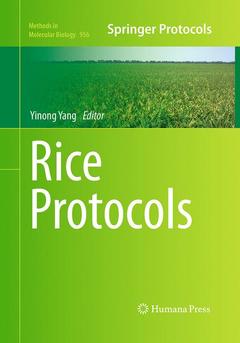Description
Rice Protocols, Softcover reprint of the original 1st ed. 2013
Methods in Molecular Biology Series, Vol. 956
Coordinator: Yang Yinong
Language: English
Support: Print on demand
Publication date: 11-2012
335 p. · 17.8x25.4 cm · Hardback
Description
/li>Contents
/li>Comment
/li>
With the completion of a finished rice genome sequence, increasing efforts have focused on functional characterization of rice genes, elucidation of the underlying mechanisms involved in major agronomic traits (e.g., high yield, grain quality, abiotic stress tolerance, and disease resistance), and the subsequent translation of genomic knowledge into agricultural productivity via molecular breeding and improved cultural practice. To meet increasing interest in this field, Rice Protocols has been compiled to provide a series of core techniques and approaches commonly used in studying rice molecular biology and functional genomics. These approaches include genetic and molecular techniques such as artificial hybridization, fluorescence in situ hybridization, generation and characterization of chemical and T-DNA insertional mutants, quantitative trait loci (QTLs) analysis and map-based cloning, site-specific transgene integration, and artificial microRNA-mediated gene silencing, along with a variety of ?omics? techniques. Written in the highly successful Methods in Molecular Biology? series format, chapters include introductions to their respective topics, lists of the necessary materials and reagents, step-by-step, readily reproducible laboratory protocols, and tips on troubleshooting and avoiding known pitfalls.
Authoritative and easy to use, Rice Protocols will prove useful for both beginners and experienced researchers whether they are molecular biologists who want to study rice plants or rice researchers who are interested in learning molecular techniques.
Rice Artificial Hybridization for Genetic Analysis.- Fluorescence In Situ Hybridization Techniques for Cytogenetic and Genomic Analyses.- Generation of Rice Mutants by Chemical Mutagenesis.- TILLING and Ecotilling for Rice.- Functional Characterization of Rice Genes Using a Gene-Indexed T-DNA Insertional Mutant Population.- QTL Analysis and Map-Based Cloning of Salt Tolerance Gene in Rice.- Site-Specific Gene Integration in Rice.- Transcriptome Profiling Analysis Using Rice Oligonucleotide Microarrays.- Cloning of Small RNAs for the Discovery of Novel MicroRNAs in Rice.- Global Identification of Small RNA Targets in Rice by Sequencing Sliced Ends of Messenger RNAs.- Artificial MicroRNAs for Specific Gene Silencing in Rice.- Rice Proteomic Analysis: Sample Preparation to Protein Identification.- Quantification of Jasmonic and Salicylic Acids in Rice Seedling Leaves.- Analysis of Insect-Induced Volatiles from Rice.- Phenotypic and Physiological Evaluation for Drought and Salinity Stress Responses in Rice.- Phenotypic, Physiological, and Molecular Evaluation of Rice Chilling Stress Response at the Vegetative Stage.- Analysis of Rice Root Hair Morphology Using Cryo-Scanning Electron Microscopy.- Inoculation and Virulence Assay for Bacterial Blight and Bacterial Leaf Streak of Rice.- Inoculation and Scoring Methods for Rice Sheath Blight Disease.- Molecular Approaches to Improve Rice Abiotic Stress Tolerance.- Molecular Strategies to Improve Rice Disease Resistance.- Molecular Strategies to Engineer Transgenic Rice Seed Compartments for Large-Scale Production of Plant-Made Pharmaceuticals.- Appendix: Genomic and Bioinformatic Resources for Rice Research.




